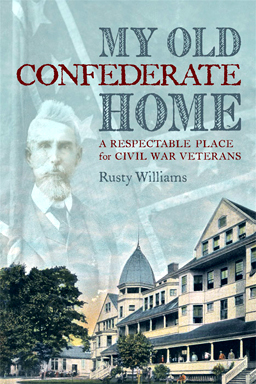|
Book Review
Kentuckians cared for their own
“My Old Kentucky Confederate Home: A Respectable Place for Civil War Veterans,” by Rusty Williams, 352 pages with notes and index, The University Press of Kentucky, 2010, $34.95.
Reviewed by
DR. PAUL D. ROMINGER
Bugle Staff Writer
"For Americans who swore their oaths to the Confederate States of America in the 1860s, their nation did not exist at the end of the war. Absent any assistance from a national government, and with only minimal aid from states financially strapped by years of war, ex-Confederates began caring for their own."
More than 40,000 Kentuckians had entered Confederate military service. The more successful of these veterans joined sympathetic women to build a place of refuge for the less fortunate Confederate veterans. With support from Kentucky government, the Kentucky Confederate Home was created, financed and furnished as an elegant charitable institution. It was open in Pewee Valley from 1902-34, and eventually housed almost 1,000 veterans.
The home received generous support from state government, from the general public and from United Confederate Veterans and United Daughters of the Confederacy. The years during which the home operated coincided with an increasing respect and pride from Kentuckians toward their Southern heritage.
What follows in the text of this interesting book is a series of vignettes, true to the style in being short and delicate. Williams writes, "To be a citizen of the Old South in April 1865 was to suffer a psychic loss not unlike that of a farmer who emerges from a root cellar the morning after a tornado to see the things he had grown and owned now flattened or gone. The heady confidence of 1861 was replaced by shock, then a grim realization of the butcher's bill paid and the need to replant and rebuild."
From Billy Beasley through George A. Booze, the stories are touching and poignant. The remaining five residents of Kentucky Confederate Home were transported to the Pewee Valley Sanitarium and Hospital on July 19, 1934. The old home fell into disrepair; the cemetery became neglected and over-grown. Around the South in the 1930s, Confederate soldiers' homes closed in Maryland, Tennessee, Alabama, North Carolina and Florida. Virginia and Louisiana followed in 1941. Beauvoir in Mississippi lasted until 1947. South Carolina opened its home to widows and daughters of Confederate veterans until 1957.
Rusty Williams concludes in language that savors of a time when sentences were crafted carefully.
"Visit Pewee Valley today and it's easy to imagine how it must have appeared a century ago. I drove there on one of those perfect pre-Derby spring afternoons that Kentucky is famous for, where the sky is the bright blue of wildflowers and fat marshmallow clouds clump and bump their way along overhead."
Several times a year, I drive from Berea, Ky., through Pewee Valley to meetings at the Kentucky Conference, United Methodist Church in Crestwood. This is beautiful country. It invites you to visit awhile. My Old Confederate Home has captured that charm. You are invited to savor Williams' book slowly as you would the company of an old acquaintance with whom you have renewed a friendship.
(EDITOR’S NOTE: Rusty Williams is a freelance writer and historian who has written for The Dallas Morning News, The Fort Worth Star-Telegram, The San Antonio Express-News and the Associated Press.)
|











